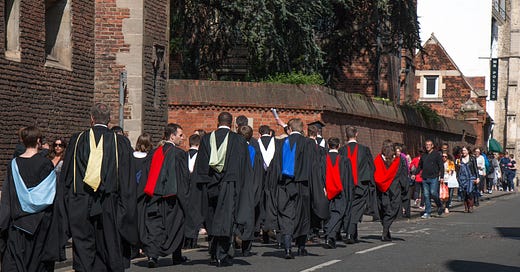Violence is presented to us as a fait accompli. This or that thug has been in power because he has always been in power. And he has always been in power because one or other of his peers had been so before him. The cycle - coupmaker, kingpin, coupmaker - perpetually self-replenishes.
The most persistent experience of growing up British-Lebanese (and partly Syrian-Palestinian) is being asked to account for this phenomenon. These inquiries are largely of a type (‘why does violence happen?’) and their conclusions of a similar stripe (‘it must be customary for these people’). This is a tidy formula for many; for those classified as ‘these people’, it is somewhat less satisfactory.
The above interrogation often forces defendants to embark upon the famed ‘condemnplanation’. It looks roughly like this (though varies with the skill and patience of the respondent):
“While [this is bad] I want to ask whether [this bad thing] could have a potential cause [which of course does not justify this bad thing] that might help us understand why [this other really very evil thing] is happening.”
Naturally, this is something of a tongue-twister. Many get shouted down, or prefer to say nothing at all. Although this has been a life-long experience, I have felt it most acutely during the past few months in Cambridge.
Indeed, if you want to be so bold as to write about Palestine, the truth must be infused with a series of diluting agents. You must contort yourself around anticipated objections by signalling to the reader that “I know I am X, but I am a good X. I am one of you, not one of them.”
You must pepper your writing with such gratuitous overtures as “While I doubtlessly condemn X,” or “Although we cannot ignore Y” that it reads like a series of vapid preambles to a UN draft resolution. You must sprint across the moat of suspicion and pull up the drawbridge behind you, lest your hard-won credibility suffer.
This hems you into a subset of inquiry firmly within the status quo. You may decry the violence inflicted upon you but not unpick it. Rather, you must resign yourself to the abstract tragedy that the terms “humanitarian crisis” or “collateral damage” insinuate without further investigation.
Suddenly, everything takes on a descriptive quality. You are invited to offer the world those brilliantly nightmarish images - the soldiers have the boys kneeling and the flames leave their flesh peeling - but not to propose an existence outside of this nightmare. Should you challenge this paradigm, inquiries may quickly shift from ‘How are you?’ to ‘How dare you?’
This relegates you to the Cambridge sandbox of discussion: Chaucer and charity shops, ball gowns and botanical gardens. Many will happily recede into such a box; violence does not concern them, it is something peered at in passing, the white scratchiness that interposes itself between television channels. When you are not forced to ask what it means to secure your existence, you can freely explore its most irrelevant minutiae and call it news (“Are flares back in vogue?” and other scintillating headlines).
But if you have been told all your life that your entire existence is violence, and that such violence is an indefensible indictment on your character - the sandbox will not do. You cannot crawl into the bookcase with Chaucer or stroll through the botanical garden at noon. When I am told I cannot dissect the foundations of a system that alienates, that ostracises, that degrades – the question that remains is identical to that of over 5 million of its current victims: where would you prefer I go, seeing as there is no dignity in staying?
Autocracy is not an ideology; it is a system of unequal relationships. Terrorism is not an identity; it is a ruthless strategy, a politics of despair. Violence is not a culture; it is a horrifically desperate insurance policy. Though fashionably presented as integral to ‘Arabness’ or ‘Islam’, these are creatures of contingency. There is no use in discussing them unless one seriously asks why and how they come to be. But instead of considering violence the product of a harrowing chain of events, it beckons in a very dubious line of deductions. Unless one is willing to examine it critically - why boys join gangs in Haiti’s Cité Soleil or militias in northwest Syria - then all we are doing is hand-wringing and window-dressing.
That is quite alright if you are looking to strap a victim and culprit to a compelling headline. If you prefer to stop such victims and culprits perpetually reproducing one another, however, it remains nothing short of useless. And that is why I am tired of writing for university newspapers.





Great article!
Looking forward to reading your articles!